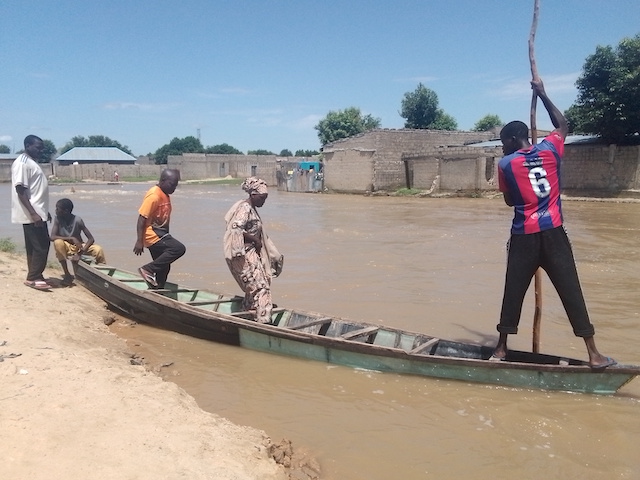The rising waters in Maiduguri, Borno State, have brought hardship and displacement to many residents, but they have also created an unexpected economic opportunity for some. Canoe paddlers have become essential for navigating the flooded streets and connecting divided communities, ferrying people across inundated areas for fees ranging from ₦30 to ₦200, depending on the distance and time of day. This surge in demand has transformed canoe paddling into a lucrative enterprise, with some paddlers reporting daily earnings between ₦10,000 and ₦20,000, particularly during weekdays. While acknowledging the unfortunate circumstances that have led to this increased demand, these paddlers view their work as a means of supporting themselves and their families during a challenging period. Their services have become indispensable for residents seeking to access essential services, move belongings from flooded homes, and maintain connections between separated neighborhoods.
The canoe paddlers operate at various strategic points across the city, including Moduganari, Fori, Polo, and Bulumkutu, often working in teams and sharing the collective earnings at the end of the day. This collaborative approach ensures that multiple individuals can benefit from the increased demand, providing a much-needed source of income in a region grappling with economic hardship. The paddlers’ work goes beyond simply transporting people; they often assist residents with moving their belongings, offering a crucial lifeline to those affected by the floods. They provide an essential service, enabling people to continue their daily lives despite the challenging conditions.
While residents generally express satisfaction with the canoe services as a necessary alternative to navigating treacherous floodwaters, concerns have been raised about price variations and potential safety risks. Some commuters report inconsistencies in pricing, with higher fares sometimes demanded during late hours. The lack of life jackets, particularly concerning given the presence of school children using the canoes, also poses a serious safety hazard. Furthermore, the reliance on canoes highlights the vulnerability of the city’s infrastructure to flooding and the disruptive impact on daily routines.
As the new school year approaches, the reliance on canoes becomes even more critical, raising concerns about the safety and well-being of students who must navigate the flooded routes to reach their schools. The absence of safety precautions, such as life jackets, combined with the increased traffic of young children using the canoes, amplifies the potential for accidents. The memory of past capsizing incidents, though thankfully involving only adults, underscores the inherent dangers of this mode of transportation in the absence of adequate safety measures.
The state government, while acknowledging the flood situation, has urged calm and assured residents that the situation at the Alau Dam, a potential source of further flooding, is under control. Governor Babagana Zulum has expressed confidence in the ongoing reconstruction work at the dam and emphasized the absence of immediate danger. However, he acknowledged the unpredictable nature of such situations and assured residents of continued monitoring. The government’s appeal for responsible waste disposal practices, aimed at preventing blockage of drainage systems, reflects the importance of community cooperation in mitigating flood risks.
The situation in Maiduguri highlights the complex interplay between environmental challenges, economic opportunities, and community resilience. While the floods have caused displacement and disruption, they have also given rise to a vital, albeit informal, transportation network operated by canoe paddlers. These paddlers have filled a critical gap in transportation infrastructure, providing essential services to affected communities while also generating much-needed income for themselves. However, the lack of regulation, safety concerns, and the underlying vulnerability of the city to flooding emphasize the need for long-term solutions to address both the immediate crisis and the larger issues of urban planning and disaster preparedness.














